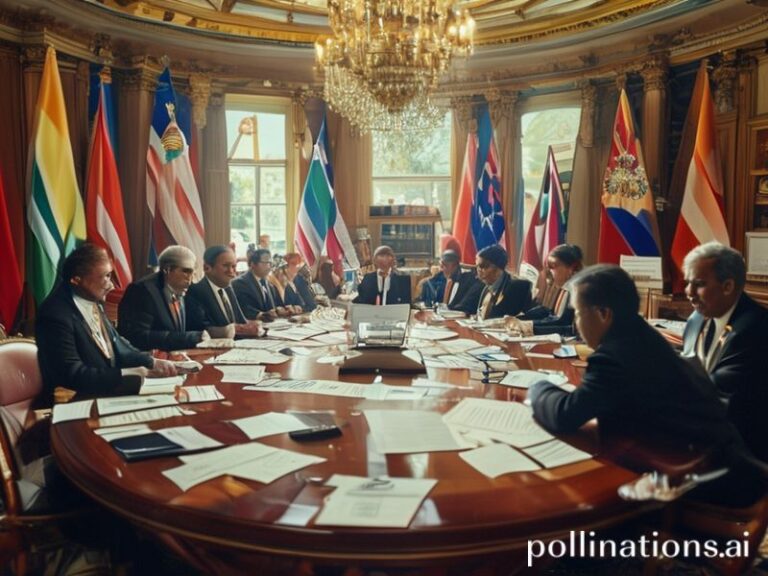Chelsea Charges: How One London Scandal Is Shaking Global Wealth Havens From Singapore to the Seychelles
Chelsea Charges: When London’s Gilded Bubble Pops Loud Enough for the Whole Planet to Hear
By Dave’s Locker International Desk
PARIS—If you listen carefully above the Seine’s indifferent gurgle and the distant honking of another pension-reform protest, you can just make out the muffled thud of yet another Chelsea townhouse closing its velvet-curtained doors on its own reputation. Across the globe, the phrase “Chelsea charges” no longer evokes quaint images of Sloane Rangers tottering out of Bibendum; instead, it has become shorthand for the moment when even the most gilded zip codes discover that gravity applies to them too—especially when it’s wearing an anti-money-laundering badge and carrying a calculator.
The scandal, for those who have been too busy watching their own national elites self-immolate, involves a daisy chain of alleged bribes, opaque offshore invoices, and renovation bills for a London mansion that would make Versailles blush. But the plot is merely local; the implications are strictly global. From Singapore’s gleaming towers—where private bankers are now Googling “how to un-name a client lounge”—to Dubai’s palm-shaped islands, where real-estate agents are quietly deleting Instagram posts captioned “Chelsea chic,” the tremors are unmistakable. Turns out the world’s wealthy had been treating London property like a Swiss bank account with a postcode, and the UK’s National Crime Agency just reminded everyone that postcodes can be subpoenaed.
Cue the synchronized sphincter-tightening in other boltholes. In the Côte d’Azur, yacht crews report a sudden uptick in requests to “file the paperwork in the opposite direction.” In Manhattan, brokers are learning to pronounce “unexplained wealth order” with the same enthusiasm they once reserved for “amenities package.” Even in Hong Kong—where the skyline is essentially a Jenga tower of shell companies—law firms are dusting off compliance manuals that were previously used to prop up standing desks.
The broader significance? The Chelsea charges mark the moment when the post-2008 bargain—“We’ll park our dubiously acquired cash in your real estate, you look the other way”—expires like milk left on a Knightsbridge balcony. Britain, suddenly post-Brexit and post-Boris, needs friends who speak the language of rule-of-law rather than rule-of-flaw. Washington, Brussels, and Canberra are nodding along sympathetically while discreetly forwarding every incriminating PDF they’ve been hoarding since 2014. The message is clear: if you want trade deals, clean up your laundry, preferably before the rinse cycle hits the tabloids.
Meanwhile, global kleptocrats are discovering that the supply of “safe” jurisdictions is shrinking faster than a crypto portfolio in May. The Caymans just hired actual prosecutors. Switzerland is voluntarily sharing data the way teenagers overshare on TikTok. Even the art world—traditional laundromat of choice—is experimenting with NFT provenance so transparent it hurts. One Russian oligarch, reportedly apoplectic at the Chelsea news, was overheard asking his assistant whether it was still possible to buy a Picasso that wasn’t blockchain-tagged, only to be told the frame now literally squeals if purchased with questionable funds.
Human nature, of course, remains reliably human. Somewhere in Belgravia, a PR firm is already rebranding “opaque beneficial ownership” as “privacy-forward asset stewardship.” In Riyadh, consultants are pitching “regulatory-compliant opulence” with the straight face of a cat claiming it meant to fall off the sofa. And in Lagos, where the phrase “Chelsea charges” has trended on Twitter alongside #OurTurnNext, citizens are savoring the cosmic justice of seeing British elites discover that crime, too, can be outsourced back to sender.
Yet for all the schadenfreude on offer, the episode exposes a universal truth: when trust evaporates, even marble floors feel wobbly. The Chelsea saga is not merely about one London borough’s brief flirtation with accountability; it is a global referendum on whether the century-long party of offshore impunity is finally winding down. The hangover, as always, will be distributed unequally: the small-fish investors checking Zoopla price drops, the housekeepers wondering if redundancy comes with severance, and the billionaires already booking flights to whichever jurisdiction still believes a private jet is an invisibility cloak.
So pour yourself something appropriately ironic—perhaps a Chelsea-filtered gin distilled in a re-possessed mansion—and toast the slow, grinding gears of international justice. They may not move fast, but when they do, they make the whole world blink. And remember: in the modern economy, the only thing more contagious than a virus is a subpoena.







